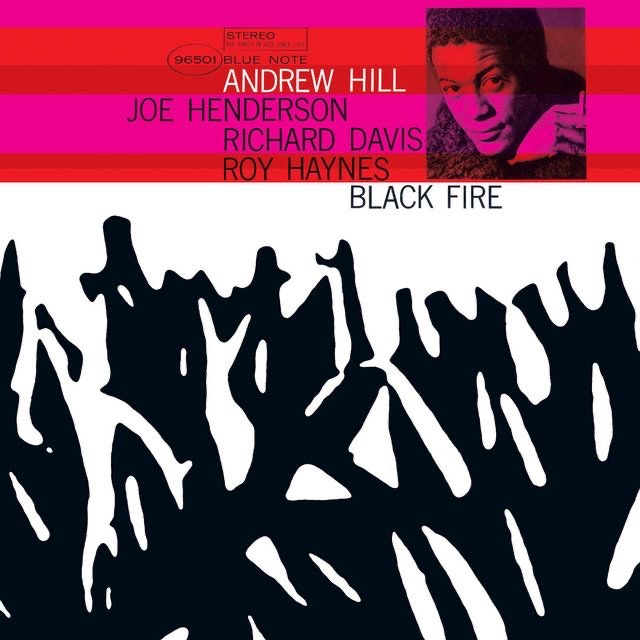Dive into the Power & Passion of ‘Tenor Madness
In the vast panorama of jazz, Sonny Rollins’ “Tenor…
I just finished listening to the last notes of Andrew Hill‘s “Black Fire,” and the experience was truly transcendent. Recorded on November 8, 1963, and brought to life by the legendary Blue Note Records, this album’s flames were kindled at the esteemed Rudy Van Gelder’s Studio, situated in the heights of Englewood Cliffs, New Jersey.

The magicians behind this masterpiece include Andrew Hill on piano, Joe Henderson on tenor saxophone, Richard Davis on bass, and Roy Haynes on drums. Each musician’s unique energy intertwines, forging a musical tapestry that both electrifies and soothes. Leading up to this session, these artists were mastering their crafts, honing their skills, and pushing the boundaries of jazz.

Hill’s intricate piano patterns, Henderson’s breath-filled saxophone, Davis’ robust bass, and Haynes’ polyrhythmic drumming all converge, creating a unique soundscape on “Pumpkin.” This track, my favorite on the album, carries a sense of urgency, intensity, and exploration, as the musicians push their instruments to their limits. Henderson’s saxophone solo speaks with authority, while Hill’s piano provides a solid foundation. Davis’ bass and Haynes’ drums interlock, driving the rhythm forward with precision and passion.
“Subterfuge” takes the listener on a journey through the depths of sonic experimentation. The track opens with a Latin-tinged rhythm, an element that remains present throughout the piece. Hill’s piano dances around the melody, weaving a rich tapestry of chords that challenge the listener’s expectations. Henderson’s saxophone soars above the ensemble, delivering a solo that is both haunting and mesmerizing. Davis’ bass lines provide a solid undercurrent, anchoring the piece as Haynes’ drums dance nimbly around the beat.

The title track, “Black Fire,” offers a smoldering intensity that leaves the listener breathless. Hill’s piano conjures a sense of mystery, while Henderson’s saxophone cuts through the texture like a razor. The track showcases the musicians’ ability to communicate with one another, displaying a musical conversation that is both intimate and expansive. Davis’ bass solo on this track is a masterpiece, as he navigates the melody with virtuosic skill. Haynes’ drumming adds an extra layer of intrigue, his syncopated rhythms propelling the piece forward.
The musical style of “Black Fire” is a blend of post-bop and avant-garde, exploring themes of experimentation, freedom, and individual expression. The musicians push their instruments beyond conventional boundaries, crafting a sound that is simultaneously familiar and foreign. The album’s compositions showcase the musicians’ collective creativity, as they bend and stretch traditional jazz forms to suit their unique vision.
Upon its release, “Black Fire” was met with a mix of admiration and skepticism. Some critics hailed the album as a groundbreaking achievement, while others dismissed it as self-indulgent and inaccessible. Nevertheless, “Black Fire” made a significant impact on the jazz world, inspiring future generations of musicians to explore new creative paths.
Today, “Black Fire” is regarded as a seminal work in the avant-garde jazz canon. The album’s bold experimentation, masterful musicianship, and unyielding commitment to artistic expression have earned it a revered status among jazz enthusiasts and musicians alike. The passage of time has only served to amplify its importance, as its influence continues to reverberate through the jazz world.
In conclusion, Andrew Hill’s “Black Fire” stands as a testament to the power of artistic exploration and the boundless possibilities of human expression. The album’s fusion of post-bop and avant-garde styles challenges the listener to reconsider their understanding of jazz, while its themes of freedom and individuality resonate with the human spirit. Each musician’s contribution to “Black Fire” adds another layer of complexity and depth, creating a rich tapestry of sound that is both invigorating and contemplative. As I sit here, still awash in the echoes of the album’s final notes, I am struck by the timeless relevance of Hill’s masterpiece. The music transcends era and genre, speaking to the core of what it means to be alive, to create, and to connect with one another through the language of sound.
“Black Fire” is a shining example of the power of collaboration and the boundless potential of art to challenge, inspire, and transform. In the face of an ever-changing world, Hill’s album serves as a reminder of the resilience of the human spirit and the importance of pushing beyond our perceived limitations. The fire ignited by Andrew Hill and his fellow musicians continues to burn brightly, leaving a trail of inspiration and wonder for all who dare to follow.
So, as you find yourself in search of a listening experience that stirs your soul and challenges your mind, I urge you to let “Black Fire” engulf you. Let its flames envelop you in the warmth of its creative spirit and guide you on a journey through the depths of human emotion and expression. And as you emerge from the ashes, transformed and renewed, may you carry with you the indomitable spirit of Andrew Hill and his fellow torchbearers, who dared to defy convention and embrace the uncharted territories of sound.